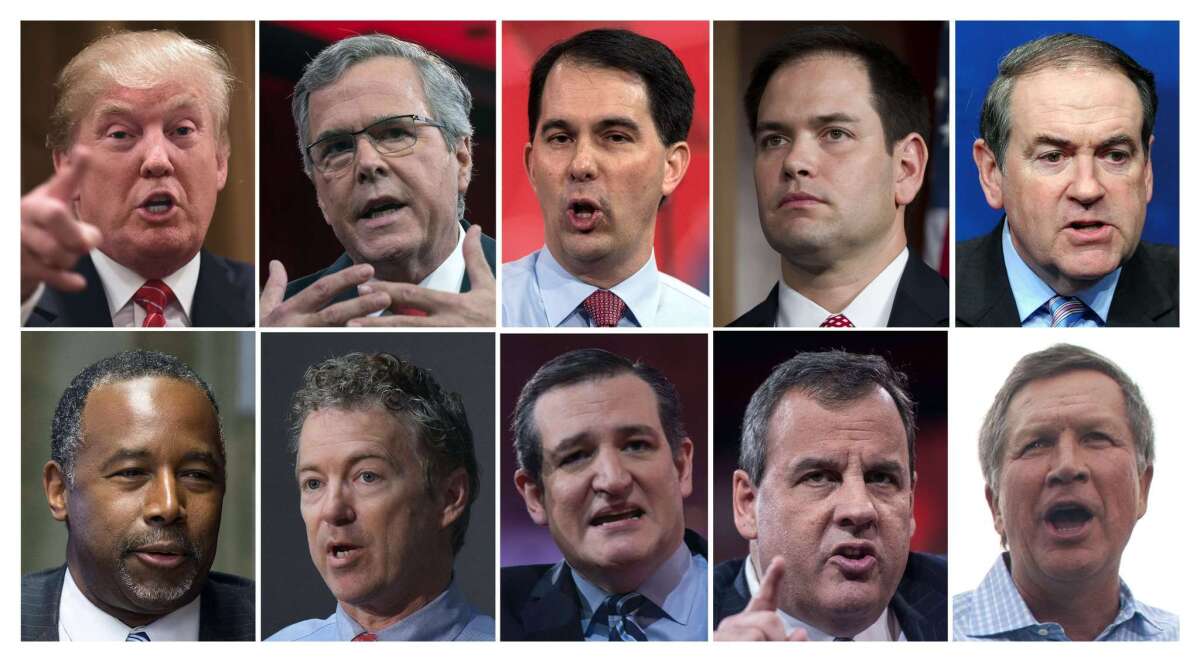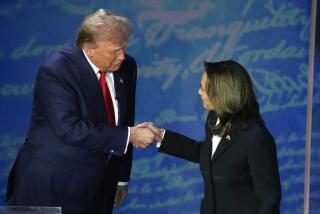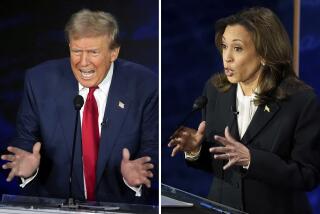Column: A quick guide to the candidates in Thursday’s Republican debate

The 10 GOP presidential candidates who will appear in the Aug. 6 Fox News debate: Donald Trump, Jeb Bush, Scott Walker, Marco Rubio, Mike Huckabee, Ben Carson, Rand Paul, Ted Cruz, Chris Christie and John Kasich.
The chairman of the Republican National Committee, Reince Priebus, hasn’t had many nice things to say about Donald Trump lately, but he ought to thank the trash-talking mogul for this: Trump will draw millions of viewers to the GOP’s first presidential debate on Thursday, giving the party a chance to reach millions of voters who wouldn’t normally interrupt a summer evening to watch politicians talk.
For the candidates, the 90-minute debate will be their first opportunity to present their cases to a large audience. In a dauntingly brief time, they’ll each try to explain who they are, display some gravitas and find a way to stand out from the crowd.
Here’s a quick viewer’s guide to the candidates:
Jeb Bush was once considered the natural front-runner, but he’s been losing ground in public opinion polls. He’s worked hard to convince conservatives that he’s one of them, but he has often sounded unfocused. Asked about terrorism at a candidates’ forum in New Hampshire on Monday, he said: “I think we’ve let our guard down a little bit…. As ISIS stays totally, you know, caliphate, literally the size of Indiana in two countries, doing nothing gives them the chance to be able to send tweets [to] people in our own country.” On stage next to Trump, Bush will look like the grown-up in the room, but can he give conservatives a reason to support him?
Wisconsin Gov. Scott Walker has risen in the polls as Bush has fallen. But his campaign has focused almost wholly on his record of cutting his state’s budget and battling public employee unions; he hasn’t offered much in the way of policy prescriptions. “What makes me different?” he said Monday. “I’m a new, fresh face…. I fought and I won.” Will Walker begin to fill in the blanks and give voters reasons to think of him as a potential president?
Sen. Marco Rubio (R-Fla.) has offered more policy specifics — so many that he sometimes comes across as wonky — but some conservatives are wary of his past support for bipartisan immigration reform. He’ll try to steer the conversation toward foreign policy.
Sen. Ted Cruz (R-Texas) may be the most polished debater in the bunch; he was a college champion at Princeton. He’s been careful to avoid criticizing Trump’s intemperate statements, in an apparent attempt to inherit the mogul’s supporters if he drops out of the race. If Trump is attacked Thursday, will Cruz rise to his defense?
Three candidates are casting themselves as different kinds of Republicans.
Sen. Rand Paul (R-Ky.), still working to expand his father’s libertarian camp in the GOP, has been forthright in criticizing his rivals as too willing to take the United States to war.
Ohio Gov. John Kasich, the most moderate Republican in the race, has called for more attention to the poor and the downtrodden — “those who live in the shadows,” in his phrase.
And Ben Carson, a retired neurosurgeon, has managed to be both incendiary (comparing Obamacare to slavery) and sensible (arguing that Republicans should replace Obamacare before they repeal it); which Ben Carson will show up?
Two more candidates have been struggling to recapture the excitement their names commanded in earlier campaigns.
Mike Huckabee has tried to appeal to Christian conservatives, but many haven’t responded. New Jersey Gov. Chris Christie has reached out to fiscal conservatives, calling boldly for cutting Social Security and Medicare benefits for the wealthy, but the only word many voters seem to associate with Christie is “Bridgegate.”
And then there’s Trump. There’s actually a way he could win this debate — by treating it seriously. That’s what he says he’ll do. “It is certainly my intention to be very nice and highly respectful of the other candidates,” he tweeted last week.
If another candidate attacks him first and he responds evenly, he wins.
But some kind of confrontation is virtually guaranteed for one simple reason: This isn’t a civics exercise, it’s commercial television.
“Trump, you know he wants to go after people,” Fox anchor Chris Wallace told the Washington Post. “And you can be sure there will be a moment … where somebody is going to give him a fat juicy ball right in there so he can go after Bush, and see how he responds to it.”
What’s less certain is how much real substance will emerge. A 90-minute debate with 10 participants means each candidate will have less than nine minutes to speak.
Still, viewers may well discover that, as a group, the GOP candidates are more talented than they knew. It’s a much stronger field than the one Mitt Romney faced in 2012 (his top rivals were Rick Santorum and Newt Gingrich). It’s possible to imagine at least four of these 10 candidates making it to the White House. Political junkies, at any rate, have plenty to look forward to. This is only the first of at least nine Republican debates. If you miss this one, another will be along in a month — and another after that.
Twitter: @DoyleMcManus
Follow the Opinion section on Twitter @latimesopinion and Facebook
More to Read
A cure for the common opinion
Get thought-provoking perspectives with our weekly newsletter.
You may occasionally receive promotional content from the Los Angeles Times.











